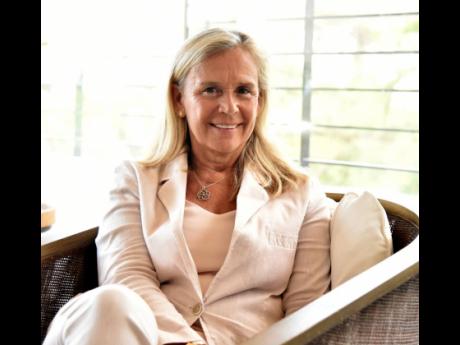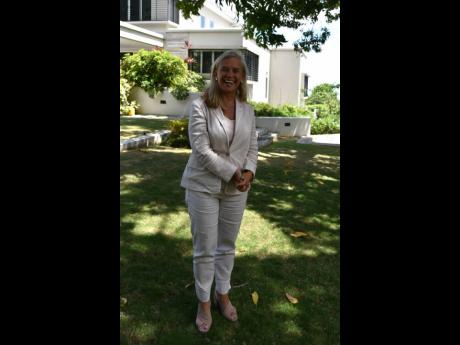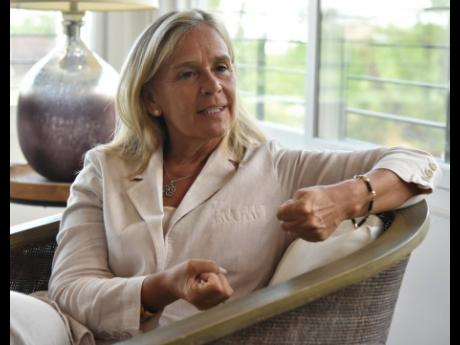EU impressed with Ja’s stable democracy
Ambassador Marianne Van Steen stresses partnership between equals
Marianne Van Steen took up her post as the European Union (EU) ambassador to Jamaica in October 2020, just over six months after the first case of the coronavirus was detected in the island.
It was the first time in her diplomatic career that she began a tour of duty without family at her side as the COVID-19-induced disruption to international travel prevented her family from accompanying her as she transitioned from Ecuador to Jamaica. Video communication relieved initial anxiety and the early lonely days were helped by friendship from the expatriate community and staff in Jamaica.
Since then, she has travelled to different parts of the island, falling madly in love with Portland, a favourite of the diplomatic community.
She is also thrilled at the variety of fruits in the backyard of her Jacks Hills diplomatic residence in St Andrew, where she finds bliss in consuming naseberry, mangoes (about three varieties), passion fruit (for juice), soursop, and breadfruit (which she never had prior to landing in the island), among other delights.
And mango ice cream is to die for, Van Steen told The Sunday Gleaner in a recent interview.
She noted that although she had picked Jamaica as her country of choice for posting, it was not a guarantee that she would have been selected, as the tropical country is highly sought after by EU diplomats.
“One of the very good things that I really like about being in this country is the political stability, democracy the rule of law. It works. There are a lot of things that are not perfect, but that's everywhere. ... But you don't have those extreme right or left-wing or populist parties, which means you have a political stability in which you can work.”
Political stability in Jamaica – and the Caribbean – is important for the EU and a fundamental difference between the region and Latin America, which she describes as areas of largely political extremes.
She has also been impressed by Jamaicans' ability to rise above their circumstances, their fire in seeking better for themselves and their children.
Captivated by the island's natural beauty and the charm of the people, Van Steen – like others in the diplomatic community – is baffled at how the island can produce unbridled joy in the spur of the moment, while unleashing bitter pain through crime and violence.
Coming from Ecuador – a Latin American country racked with organised crime, narco-trafficking, widespread corruption, and weak political institutions to handle crime – she is all too familiar with how crime wreaks havoc on a country.
With telling similarities, it appears Jamaica picked itself for Van Steen. The country that fascinates so many on the outside is murdering 40-plus persons per 100,000 citizens. Ecuador's figure is 50 per cent less per 100,000 of the population.
Still, she has come with the mission to continue tackling shared priorities between Jamaica and the EU, with grant funding until 2027 and programmes in a seven-year cycle. The Ukraine-Russia conflict, she disclosed, will not derail commitments.
While it's not her or the EU's intention to interfere in the internal affairs of Jamaica, Van Steen reminded The Sunday Gleaner that she is accountable to the taxpayers of the 27-country bloc who finance the grants.
“I believe in the rule of law, the protection of human rights, the dignity of human beings, all of these things. They are so important,” she expressed.
Partnership between equals
With many shared values, the EU, Van Steen said, is not just a donor agency to countries like Jamaica. Instead, she said, the main lesson of the pandemic was the interdependence of nations in all regions. Development was more likely among allies.
“That is a message which I gave when I arrived here and I am really trying to put out there all the time. We need to give visibility to all the support we give to the country because otherwise, my EU taxpayers are not going to like it,” she told The Sunday Gleaner.
“But it's not just about the money. We need Jamaica and Jamaica needs us in the fight for climate change. We need Jamaica and Jamaica needs us in order to make sure that democracy prevails and not autocracy, which is a serious challenge in the 21st century. So there are so many issues on which we need each other ... . I mean, you have one vote in the United Nations (UN); we have one vote per country. It's not about the economic size of a country, it's about what we believe in,” she explained.
The building and maintenance of democratic institutions is critical to that relationship.
To her surprise, Jamaica is the only country where she has been which has not requested direct access to Europe via the Schengen Visa. It was an agenda item for most of her interactions in Latin America. While in Brussels at a high-level meeting of the EU, she will put the matter on the table for consideration. She believes Jamaicans would benefit from a waiver of the visa, and while it is a process, it begins with an agreement from member states.
Van Steen said the EU is aligned with the Government's own ambition to build a digital society, while the buildout of climate change resilience will have an urban focus. Keen attention will be also paid to citizen security with a focus on preventative and protective measures that can reduce crime.
It didn't take her long to start asking questions about downtown Kingston, an area with very rich untapped potential.
“Let us look at the macroeconomic management of the country. There have been problems, of course, and we know the International Monetary Fund (IMF) has come in. But then the Government has done quite an impressive job in order to get things straightened out. Still very challenging, but I think we all see the effort which has been made by the country. And the EU, when we work or assist a third country, for us, it is very important how public funds are managed because it's all about trust,” she told The Sunday Gleaner.
Trust between the EU and its partners, Van Steen emphasised further, was very important, with accountability being paramount. If trust cannot be established but funding is provided, the bloc will work with intermediaries, such as civil society and non-governmental agencies.
“What I am saying is that with Jamaica, we have done a lot of those assessments on the public finance management, and we did come to the conclusion that we can trust the micro public expenditure management programme here. And these are really neutral objective expert assessments. It is not even us – me or my team. We have experts coming from the World Bank, IMF checking up. So what do we do?” she said, preparing to outline the next steps.
“The fact that we have trust in the country, we actually are able to inject funds in the budget of the Government. And that's what we did with the Forestry Department ($128 million) grant. Jamaica said, 'We have lovely forests and we want to keep them' ... . So the country adopts a forest-management plan, and we think that is lovely. We are not going to finance the implementation of that plan, but we will give that incentive for the Government to implement its own plan,” the ambassador explained.
The EU was not implementer of any programmes, but will support initiatives which align with its values.
Last month, the Boosting Innovation, Growth and Entrepreneurship Ecosystems programme was given €7 million (more than J$1.2 billion) in grant funding to help female-led businesses build their capacity to contribute to the economy. Funds are facilitated under the EU's Caribbean Investment Facility and the Inter-American Development Bank will administer the grant.
“ ... We sit together with the Government once a year ... and we explain what's going on in the EU and the Government talks about what is happening here, mainly because I need to inform my headquarters of what is happening in the country. It's all about making a difference,” she said.
A high-level official from the EU will come to Jamaica next month for these talks, and while “aid is not conditioned to anything”, it does not prevent dialogue about things which may be unpopular.
Belize, The Bahamas, Turks and Caicos, and Cayman Islands are also under Van Steen's purview and the development programme for the region and she noted that there is no one-size-fits-all model. She disclosed that The Bahamas has received the least in benefits and is upset that its high GDP is used to define the country, which has no bilateral inflow but is eligible for regional programmes.
Of the countries she has under her umbrella, Van Steen said, Jamaica receives the most from the EU.
Jamaica and the EU established diplomatic ties in 1975 and Ambassador Van Steen stressed that the Post-Cotonou Agreement presented the blueprint to develop a partnership of equals. Jamaica is not a child being spoken to, but an adult at the table, she said.
EU's financial support for Ja 2021-2027
Three main priorities:
1. Sustainable and inclusive economy (focus on digital transitioning)
2. Climate change and environment (focus on adaptation and resilient infrastructure)
3. Good governance and human security (focus on citizen security) with an indicative budget of €30 million (J$5 billion) for the period 2021 to 2024.
Sum likely to be topped-up in 2024 for the rest of the years until 2027 based on results obtained in the initial period.
• Under the bilateral programme for cooperation in 2014-2020, €66 million (approximately J$11 billion) was allocated to Jamaica, focusing on four sectors: justice, environment and climate change, public finance, and citizen security.
• Jamaica also benefited from other EU external action instruments, initiatives or agreements during the period. The EU collaborated with the UN to launch the global Spotlight Initiative.
Investment of €8 million (J$1.3 billion) over three years to assists prevention and reduction of family violence.
• The EU donated 29 ventilators valued at approximately €1 million to the Government to support COVID-19 patients in intensive care. Jamaica, along with other Caribbean member states, also benefited from a grant of €8.5 million to assist in the COVID-19 fight through partnership with the Caribbean Public Health Agency.
• Funding of between €200,000 and €500,000 to at least five civil society organisations in different sectors for the promotion of human rights and the fight against climate change.



